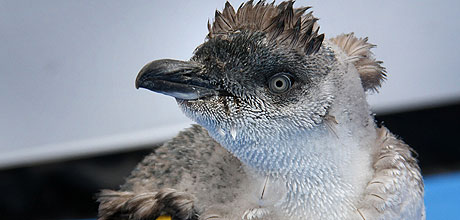Maritime New Zealand is reporting a small number of oiled birds are being collected off Bay of Plenty beaches due to the Rena wreck.
Oiled wildlife response manager Teri McClelland says the number of oiled birds – alive and dead – being collected from around the Bay of Plenty remains low compared to the numbers collected following the oil spill in October 2011.
Little blue penguins housed at Massey are going through their annual moulting process. Photo: Maritime New Zealand.
More than 2000 dead birds were collected off beaches following a storm on October 11 in which about 350 tonnes of heavy fuel oil leaked into the ocean from Rena, washing ashore on the BOP coastline.
Teri says only a small number of birds have been collected since more oil leaked from the Rena when it broke in two on January 8.
She says this is due to the fact only small amounts of oil is reaching the shoreline, and also because little blue penguins are currently in their moult period.
'Penguins go through what is called a ‘catastrophic moult', which means they lose all their feathers and then grow them all back.
'The moult takes between 10 and 18 days. When the penguins feel they are soon to start moulting, they start eating a lot to fatten themselves up and then they tuck themselves up in their burrows to wait out the moult.”
The penguins have no waterproofing while the moult is underway, so they remain in their burrows and do not go into the sea to feed.
'There's a reasonably long moult season, between December and March. The timing is actually quite good this year, as it means a lot of them are safely tucked away and not going into the water and coming into contact with oil or debris.”
The oiled wildlife team are conducting both day and night patrols around coastal areas following the breaking up of the ship on January 8, but have so far found very few penguins affected by oil.
'We are receiving a lot of reports of dead birds, but very few of them are actually oiled. There is a high natural mortality rate at this time of year, so it could just be that.
'Many of these birds have just left the nest and are experiencing their first ventures into the big wide world. We are taking in the dead birds and will be conducting autopsies to confirm the causes of death where we can.
'It's important that people don't disturb the birds while they are moulting,” says Teri.



0 comments
Leave a Comment
You must be logged in to make a comment.